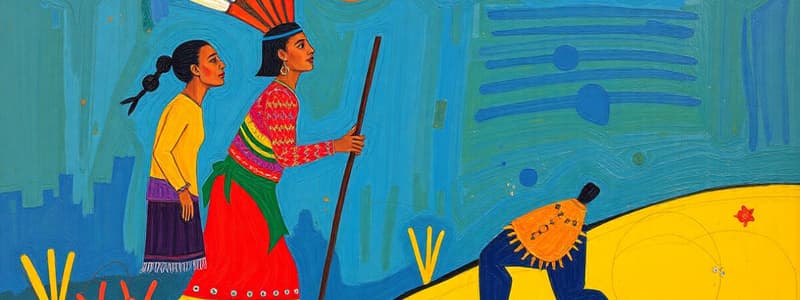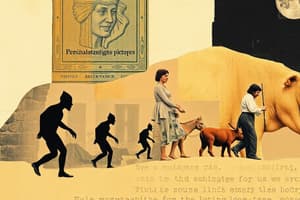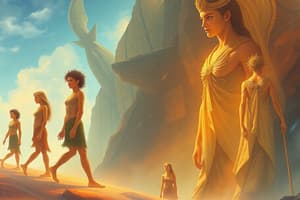Podcast
Questions and Answers
What are the five aspects of the humanization process?
What are the five aspects of the humanization process?
- Political Centralization, Market Exchange, Industrial Mass Production
- Sedentary Lifeways, Animal Domestication, Politicization, Commercialization
- Symbolization, Materialization, Verbalization, Socialization, Enculturation (correct)
- Genocide, Ethnocide, Ecocide
Prior to the 1700s, Indigenous peoples were a majority group.
Prior to the 1700s, Indigenous peoples were a majority group.
True (A)
What types of societies have primarily been negatively impacted by commercialization?
What types of societies have primarily been negatively impacted by commercialization?
Small-scale societies
The process of humanization involves producing abstract concepts, which is known as ______.
The process of humanization involves producing abstract concepts, which is known as ______.
Match the historical periods with their corresponding developments:
Match the historical periods with their corresponding developments:
Which of the following is NOT a consequence of the commercialization process for small-scale societies?
Which of the following is NOT a consequence of the commercialization process for small-scale societies?
What are the three forms of large-scale societal organization?
What are the three forms of large-scale societal organization?
Indigenous peoples have always passively accepted the loss of their autonomy.
Indigenous peoples have always passively accepted the loss of their autonomy.
Voluntary isolation is a common strategy indigenous groups have successfully used to avoid conquest.
Voluntary isolation is a common strategy indigenous groups have successfully used to avoid conquest.
What are two major consequences of debt peonage for indigenous communities?
What are two major consequences of debt peonage for indigenous communities?
Which of the following is NOT a justification used for conducting punitive raids against indigenous peoples?
Which of the following is NOT a justification used for conducting punitive raids against indigenous peoples?
The use of overwhelming military force to intimidate or punish indigenous groups is known as ______.
The use of overwhelming military force to intimidate or punish indigenous groups is known as ______.
Match the following terms with their definitions:
Match the following terms with their definitions:
Which of the following is NOT a way militarization occurs?
Which of the following is NOT a way militarization occurs?
Conquest and colonization are interchangeable terms that mean the same thing.
Conquest and colonization are interchangeable terms that mean the same thing.
What is ethnocide and how does it relate to the concept of colonization?
What is ethnocide and how does it relate to the concept of colonization?
The Zapatista Revolution is considered a modern example of a society fighting ______ an indigenous group.
The Zapatista Revolution is considered a modern example of a society fighting ______ an indigenous group.
Match the terms with their definitions:
Match the terms with their definitions:
The 'culture of consumption' promotes the idea that consumption should be constantly expanded, even for materials designed to help us reduce consumption.
The 'culture of consumption' promotes the idea that consumption should be constantly expanded, even for materials designed to help us reduce consumption.
Which of the following ideologies is associated with the 'culture of consumption'?
Which of the following ideologies is associated with the 'culture of consumption'?
What is the term for the process by which previously unowned natural resources become the property of a person, group, or institution?
What is the term for the process by which previously unowned natural resources become the property of a person, group, or institution?
The principle of ______ is often used to justify harsh programs of Indigenous acculturation.
The principle of ______ is often used to justify harsh programs of Indigenous acculturation.
Match the following concepts with their definitions:
Match the following concepts with their definitions:
Which of the following is NOT a consequence of the 'culture of consumption' on Indigenous communities?
Which of the following is NOT a consequence of the 'culture of consumption' on Indigenous communities?
Indigenous cultures are sometimes viewed as failures by dominant cultures to justify resource extraction.
Indigenous cultures are sometimes viewed as failures by dominant cultures to justify resource extraction.
What is the primary goal of the 'culture of consumption' as it applies to Indigenous communities?
What is the primary goal of the 'culture of consumption' as it applies to Indigenous communities?
Flashcards
Voluntary Isolation
Voluntary Isolation
Groups choose to isolate themselves to avoid conquest.
Extermination for Dispossession
Extermination for Dispossession
Using extermination to remove Indigenous peoples from their land.
Debt Peonage
Debt Peonage
Traders offer overpriced goods on credit for undervalued local goods.
Disruption of Traditions
Disruption of Traditions
Signup and view all the flashcards
Punitive Raids
Punitive Raids
Signup and view all the flashcards
Humanization Process
Humanization Process
Signup and view all the flashcards
Symbolization
Symbolization
Signup and view all the flashcards
Materialization
Materialization
Signup and view all the flashcards
Socialization
Socialization
Signup and view all the flashcards
Enculturation
Enculturation
Signup and view all the flashcards
Ecocide
Ecocide
Signup and view all the flashcards
Indigenous Resistance
Indigenous Resistance
Signup and view all the flashcards
Commercialization Effects
Commercialization Effects
Signup and view all the flashcards
Militarization
Militarization
Signup and view all the flashcards
Ethnocentrism
Ethnocentrism
Signup and view all the flashcards
Conquest
Conquest
Signup and view all the flashcards
Ethnocide
Ethnocide
Signup and view all the flashcards
Zapatista Revolution
Zapatista Revolution
Signup and view all the flashcards
Culture of Consumption
Culture of Consumption
Signup and view all the flashcards
Social Stratification
Social Stratification
Signup and view all the flashcards
Resource Appropriation
Resource Appropriation
Signup and view all the flashcards
Wardship Principle
Wardship Principle
Signup and view all the flashcards
Indigenous Sovereignty
Indigenous Sovereignty
Signup and view all the flashcards
Study Notes
Humanization Process
- Biological production and maintenance of human beings
- Cultural production and maintenance of human societies and cultures
Aspects of Humanization
- Symbolization (creating abstract concepts)
- Materialization (giving physical form to concepts)
- Verbalization (creating human speech)
- Socialization (creating permanent human societies)
- Enculturation (reproducing culture)
Indigenous Societies
- Prior to 1700s, Indigenous groups comprised the majority
- Large-scale societies organize through political centralization, market exchange, and industrial mass production
- Small-scale Indigenous groups focus on family, sustainable lifeways, and small-scale social organization
Historical Context
- Anthropologists and historians before the 1970s viewed Indigenous groups as "objects of study"
- Indigenous peoples experienced genocide and ethnocide for "progress"
The Process of Cultural Change
- Ethnocentrism - belief in the superiority of one's own culture, used to justify imposing cultural change or even elimination of other cultures (ethnocide).
- Conquest - takeover and colonization by powerful societies.
- Colonization - dominating surrounding land and resources.
- Resource appropriation - control of natural resources for economic gain.
- Acculturation - cultural modification through adaptation to a dominant culture.
- Cultural modification - forced cultural change, impacting individuals, groups, or communities.
- Debt Peonage - trapping Indigenous groups in debt through loans for overpriced goods.
- Dispossession - forced removal of Indigenous people from their lands.
- Disruption - weakening of Indigenous social structures, subsistence systems (hunting, gathering), cultural organization.
Modern Interactions
- Punitive raids - acts of intimidation and punishment used to enforce cooperation with the government
- Militarization strategies - various forms employed to control and suppress Indigenous groups (e.g., military-supported invasions).
- Indigenous groups have employed resistance via military tactics and self-determination movements
Additional Definitions
- Indigenous Peoples - those whose ancestors preceded the state in a given territory.
- Ecocide - the destruction of natural environment.
- Warfare Tactics (Modern and Historical) - Indigenous people and colonizing powers have utilized different forms of warfare (e.g., guerrilla warfare contrasting with weaponry, modern military tactics).
Studying That Suits You
Use AI to generate personalized quizzes and flashcards to suit your learning preferences.




